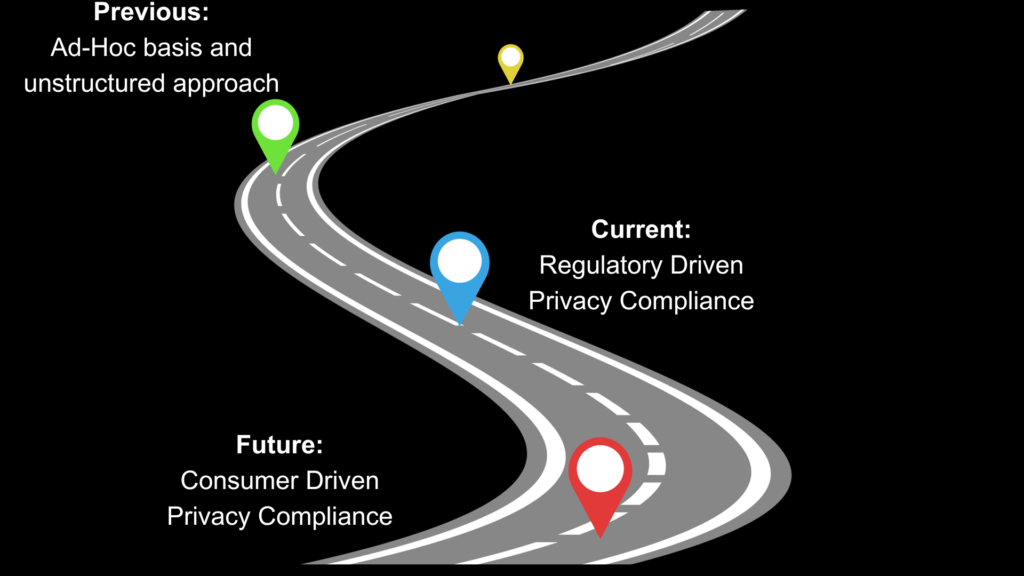Awareness regarding consumer protection is increasing rapidly and organizations are in need of implementing mechanisms to process consumer personal data in a secure manner. Though not markets internationally are mature w.r.t privacy compliance, the maturity is increasing gradually. For example, if we take European Union back in 2016 started talking about a comprehensive personal data protection framework, today called as GDPR. However, the current situation in Europe is very dynamic and organizations are striving to keep up to the speed of legislators. Interestingly, consumer awareness is growing at par with legislators’ execution of the legal framework execution. Thus consumer driven data privacy compliance is not far away.
We are seeing a lot of consumer driven technologies such as AI, Metaverse, Blockchain, NFTs, etc. growing at a rapid pace leading to uncontrollable processing of personal data. In fact, the scope of Personally Identifiable Information (PII) is expanding day by day to include information such as behavioral characteristics of an avatar in metaverse and any output of AI driven program leading to identification of an individual. Thus regulatory requirements tend to become a basic framework on which organizations need to build multiple layers of personal data protection.

Before the year 2016 to 2018, industry sectors defined their privacy standards, and organizations falling under those sectors made some effort to comply with them. Of course, there were laws recognized in certain regions across the world, but it was geographically restricted. Also, the approach was siloed and consumers or individuals affected by the regulations were not aware of it. The bigger issue was concerning the organizations outside the scope of the regulations, and the number was extremely high. These organizations were unregulated and consumers did not have a legal basis to protect their data (despite being a human right), even if they had awareness. Now, owing to this regulators started working on federal data protection laws, focusing on the basic human right to privacy.
As consumer awareness related to right to privacy gradually increased along with exponential technological development, free usage of personal data for technology became challenging. Regulators predictively started working on comprehensive and federal data protection laws to protect the interest of their country’s citizen. This is when world saw one comprehensive data protection law – GDPR being enacted from May 25, 2018. Since then, many countries increased efforts to protect personal data owing to multiple reasons such as – protecting PD interest of citizens, enable safer cross border data transfer, ease business transactions, etc. We are in this era where regulations are still maturing and organizations are aligning their businesses to meet regulatory requirements. We witness a strong collaboration between organizations and regulators owing to the recency of personal data protection concepts. However, this will not stay this way for a long time.
The future of Data Privacy will be very different. More than regulatory-driven, it will become consumer-driven. Regulators would still play a crucial role in monitoring and governing the organizations falling under them. However, consumers will start shaping the requirements from a personal data protection perspective. This might be difficult to envision in the current stage where awareness is less and consumers play an insignificant role in the majority of the markets. As with any other law or technology, as awareness grows, we will witness consumer driver privacy compliance requirements.
Few factors which would lead to consumer driven privacy requirements are:
- Rise in consumer awarenss
- Adoption of new personal data driven technologies by consumers
- Ease of access to regulators
- Ease of enforcement of rights
- Personal Data compromise leading to disturbance to one’s right to privacy
As the market matures and consumer driven privacy requirements goes on the rise, we may start seeing the following changes in the privacy landscape.
- Increase in the number of rights request
- granular notice and consent requirements
- Consumers pushing regulators and more number of litigation cases related to personal data protection
- Less tolerance towards data privacy breaches leading to volatility w.r.t consumer retention and loyalty
To comprehend this, think of yourself in a situation 10 years ago and the same situation today regarding data privacy. 10 years ago such a concept would have been even more difficult to imagine, whereas now, we are seeing that we know at least a bit about data privacy and how it affects our life. Of course, such a cultural shift takes time for consumers to adapt and realize their Right to Private Life (Data Privacy) and organizations even if not bound by any regulatory requirements must start recognizing these. If this is not recognized at the right time and consumer protection is not given importance, companies might start losing consumer trust and eventually lose clients.
In conclusion, consumer-driven data privacy requirements might happen sooner than we think and organizations must start investing effort towards consumer data protection and data privacy.

Well written. IMHO however unless regulatory framework exists, no amount of consumer insistence can protect consumers from data breach/ cater for data privacy. This is similar to consumers insisting of quality products at reasonable rates but end up getting cheated anyways or consumers objecting to their photos being taken without their approval, but there are no laws to prevent these.
So what I am trying to say is that for effective consumer privacy laws/regulations are primary. Consumers can drive enacting such laws but without these laws/regulations implementation will not be possible